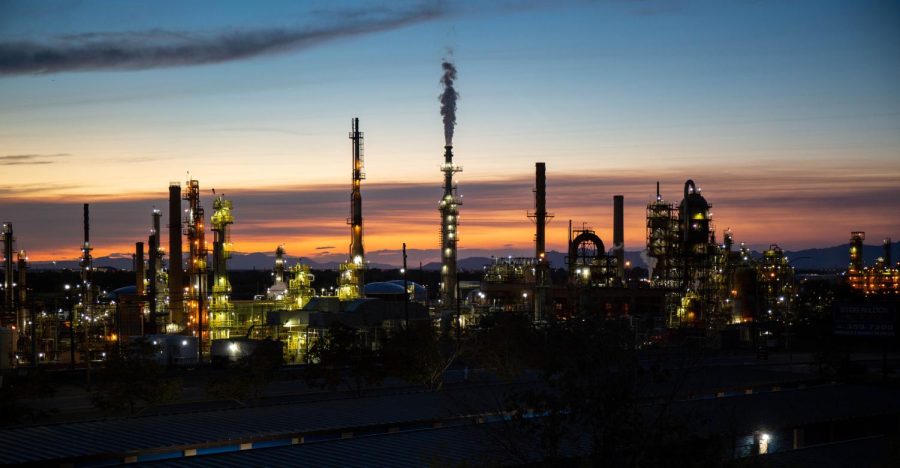Utah’s Fossil Fuel Industry: Is Divestment Possible?
(Photo by Gwen Christopherson | The Daily Utah Chronicle)
November 3, 2021
Despite the nation’s dependence on electricity generation from coal decreasing from 60% to 33% in the past two decades, Utah still gets 76% of its electricity from coal, according to the Healthy Environment Alliance of Utah. The fossil fuel industry pollutes the atmosphere by releasing mass amounts of greenhouse gases that contribute to the warming of the climate.
DivestU is a student organization at the University of Utah dedicated to building a better future by divesting the U’s endowment funds in the fossil fuel industry.
Taylor Monney, a law student at the U and leading member of DivestU, said this organization is a student-led group working with the U to end its reliance on fossil fuels by focusing on its endowment fund.
“This is an investment or body of investments that the University has in all kinds of sectors that is about $1 billion total and about $60 to $90 million of that is invested in fossil fuels,” he said.
Monney said divestment is a nationwide movement and other schools have started to focus on sustainability efforts. However, the U is the only campus in Utah with a currently active divestment campaign, according to Divest Ed.
“The climate crisis is real,” Monney said. “I want to be a part of institutions that are on the forefront of positive action that is making choices that are thinking of the long term for our future.”
Money expressed his dedication to this project and encouraged others to speak out and help make these issues known.
The climate crisis is easy to overlook, he explained, when there is an “overriding profit incentive.” In the short term, divestment may not be the best financial action but is one that can benefit the overall climate crisis and help to save the planet.
“The academic senate has voted twice in favor,” Monney said.
Monney said the vote towards full divestment has been ongoing.
The remaining decision goes to the board of trustees, where they will consider the alternatives to divestment and decide if it is the right move to make.
“If divestment doesn’t take place and we continue down this business-as-usual road, the Earth will continue to warm, severe weather patterns will continue to increase, we’ll continue to see the destruction wrought by the climate crisis similar to what we saw this summer with hurricanes and wildfires,” he said. “While divestment can’t solve this by itself, put together if we move away from fossil fuels and towards renewable energies, we won’t see an increase in this catastrophic cycle that we are in.”
He emphasized the importance of students’ minds and voices in driving this movement.
“What this crisis demands of us is collective action by working together to have our economic and personal priorities align with long-term environmental sustainability,” he said.
Monney said there is support for divestment from new industries.
“One of the growing sectors of industries is renewable energy,” he said.
According to the Trust Lands Administration, natural gas and crude oil companies in Utah are thriving. The U.S. Energy Information Administration said 1 in every 10 barrels of crude oil produced in the Rocky Mountain region come from Utah.
However, these industries have serious impacts on the environment. The Environmental and Energy Study Institute says an excess buildup of greenhouse gases, as caused by fossil fuels, has caused “dramatic changes” to the Earth.
DivestU and other environmental groups hope to mitigate these drastic effects through divestment.
However, for many industries, it is not possible to fully divest in the near future.
For So Nev Construction, a dirt work and mining company based out of Utah, divesting is not possible.
Dirt work industries often help to build the solar industries Monney and others committed to divestment advocate for. These companies, which can not realistically commit to full divestment, can help others to.
“It’s just not possible — there are no other options,” said Amy Lay, the office manager of the company. “We just don’t have an alternative that would work for us.”
For this industry specifically, electric vehicles are unreliable and less powerful than those requiring diesel fuel, Lay said. In an industry that is competitive based on the most efficient and cheapest way to get a job done, it is impossible to use more expensive equipment that is simply not reliable.
“Without fossil fuels, there would be a lapse in jobs in the industry, a lapse in production period in the industry,” she said. “That puts hundreds of people out of a job.”
While divestment may be a necessary option to solve the climate crisis, it is not always a plausible option for industries.









